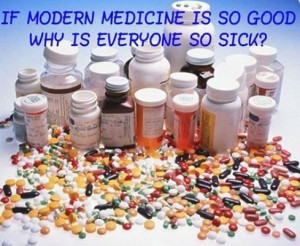The drug companies are trying to make us dependent on them. Today’s drugs don’t just treat the health conditions we have, but are sold to us just in case we develop illnesses we don’t yet have.
A good example is statins. Statins are claimed to reduce cholesterol in the blood which, they claim, reduces the risk of heart attacks, angina and strokes. These claims are based on the premise that high cholesterol is a major factor in heart attacks, yet 75% of heart attack victims have normal levels of cholesterol! The manufacturers recommend that they be given to people with ‘normal’ levels of cholesterol, as if ‘normal’ has become ‘risky.’ Obviously it is profitable to convince us that we are at risk and that taking their drugs reduces that risk.
Like all drugs, statins hey have side effects, e.g. fatigue, headaches, diabetes, gastrointestinal disorders, muscle pain and forgetfulness. There is no such thing as a totally safe chemically-based medicine.
Dr Gary Greenberg’s book, ‘Manufacturing depression: The History of a Modern Disease’ argues the same happens with antidepressants – drug companies falsely advertise their benefits and ignore their side effects. They have persuaded us that huge numbers suffer from depression when in fact they probably do not. For example, before Prozac was launched in 1986, only 100 people per million were diagnosed as depressed; today 100,000 per million, a thousand-fold increase.
What should we make of reports that pharmaceutical companies are currently working with academics to develop drugs that regulate the body’s circadian clock so they can control jetlag and treat some sleep disorders?
Does the pharmaceutical industry have us under mass hypnosis? It dominates the medical journals and spends huge sums on research. Its approach to medicine is virtually unquestioned in medical schools where the next generation of doctors are trained. Its products are heavily marketed, it spends a fortune sales promotion, especially with medical professionals, and successfully challenges any approach to healing that does not serve its interests (e.g. most forms of natural medicine).
Pharmaceutical companies are engaged in a search for pills that everyone can take as preventatives, not just those who are ill. They’re talking the general public with them, believing they could have a longer, healthier life. In fact, most welcome it.
But drugs do have their place
But despite all this, drugs do have a place. They can bring quick relief, and sometimes are essential. For instance anti-rejection drugs are essential in organ transplants, and many with serious psychological conditions like schizophrenia and bi-polar disorder can have a reasonable quality of life that would be impossible without them. Similarly thyroxin helps patients with under-active thyroids live a normal life.
It’s something of a cliché that doctors are too quick to reach for their prescription pads rather than explore health problems from a more holistic point of view. Personally, I’ve found that doctors vary considerably in this respect. In the practice I attend, one of the doctors is over-hasty to prescribe, but one of the others takes a different approach and often appears reluctant to prescribe until other avenues have been explored.
There is of course a biochemical component to the body. We know how powerful changes in biochemistry can be. E.g. alcohol affects biochemistry, including mechanical stability, mental functioning, speech and behaviour. But we are also mental and energetic beings. 99.999% plus of our bodies are empty space, waves and particles spinning at great speeds to form atoms which form molecules and cells.
Any medical approach that does not take account of the body’s natural rhythms and energy flows and the impact of the environment on the human biofield will one day be as redundant as leeches are today.
©David Lawrence Preston, 28.7.2016
Follow me on Facebook and Twitter @Feelinggoodatt
Visit www.feelinggoodallthetime.com


Leave a Reply